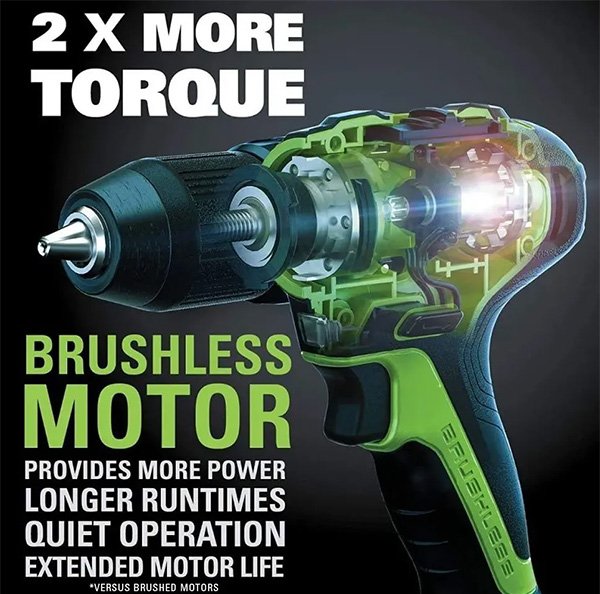
If you buy something through our links, ToolGuyd might earn an affiliate commission.
Dear Tool Brand,
I posted about your cordless power tools the other day, specifically your cordless drill and impact driver combo kit.
Your brand has an interesting selection of tools and OPE, and for various reasons I started looking at your 24V Max power tools.
There were some errors in your specs. Specification and transcription errors are commonplace online, and I generally consider them to be forgivable.
I am happy you informed me that no, the cordless drill does not output 2,000 lumens of illumination from its built-in worklight.
But you make 3 broad claims about your cordless drill and impact driver, and I am having a hard time understanding where you’re coming from.
Here’s what you say:
20% more power**
35% more runtime**
2X more torque*
** Compared to similar 18V power tools.
* Versus brushed motors.
ALL of your 24V Max tools are said to deliver 20% more power and 35% more runtime.
24V Max battery packs have 6 Li-ion battery cells (and 21.6V nominal), and 18V batteries have 5 cells. One more cell means 20% greater voltage. But that’s voltage, not power.
Now, if there are two tools, one 24V Max and one 18V/20V Max, and they both draw the same current, say 2.0A (amps, not amp-hours), then yes, the 24V Max tool will be operating at 20% more power.
BUT when you step up to a higher voltage, the current draw is usually lower. So, that 20% more power is not universal. It could be true, or it could not be, it depends on different tools and comparative baselines.
If these are higher-performing tools, then they could be delivering more power, but are these higher performing tools?
The same goes for your 35% more runtime claim. Saying “compared to similar 18V power tools” isn’t enough.
Most other brands point to their own older models when they make comparisons, and this gives them a fixed reference point. In your marketing claims, there does not seem to be any fixed reference points.
Even Harbor Freight will usually say something like “compared to stated specifications of our standard product.” You know it’s bad when Harbor Freight is used as the positive example.
I don’t like vague comparisons. But, let’s move on.
Your product manager emailed me, saying:
For the 2x more torque, we use that claim for brushless versus brushed motors.
Ah, okay. Their cordless drill delivers 2X more torque than brushed motor tools. I asked them how this claim is substantiated, and have not yet heard back. Let’s look at it ourselves.
Your Brand 24V Max Cordless Drill Specs
- 0-380/0-1450 RPM
- 310 in-lbs max torque
Harbor Freight Bauer 20V Max Cordless Drill Kit

- 0-450/0-1700 RPM
- 450 in-lbs max torque
Hart 20V Max Cordless Drill Kit

- 0-440/0-1600 RPM
- 370 in-lbs max torque
Let’s Compare Specs
Speed
- Your Tool: 0-380/0-1450 RPM
- Bauer: 0-450/0-1700 RPM
- Hart: 0-440/0-1600 RPM
Max Torque
- Your Tool: 310 in-lbs
- Bauer: 450 in-lbs
- Hart: 370 in-lbs
Pricing
- Your Tool: $130 for the kit
- Bauer: $65 for the kit
- Hart: $69 for the kit
Harbor Freight and Bauer are the least expensive and lowest spec’ed 18V/20V Max cordless drills I could find. Both brands can be characterized as being entry-level, or maybe higher entry-level?
There are some lower-spec’ed 18V/20V Max cordless drills, usually single speed and sub-$50 models with 3/8″ chucks, but that would not be a reasonable comparison to make.
Both Bauer and Hart cordless drills are faster and deliver more torque than your’ higher voltage and brushless motor-equipped drill. Not only that, their kits are far less expensive as well.
So that brings up the question – which brushed motor models are you comparing your drill and impact driver to?
So What’s Going on Here?
I’m going to give you the benefit of the doubt.
Maybe you got your torque specs wrong and this drill delivers plenty more than 310 in-lbs of max torque.
Maybe you have a particular brand or model in mind for these claims.
I cannot see how the “2X more torque” claim could be valid, and I compared it to quite a few other 2-speed and 1/2″ chuck brushed motor cordless drills, just in case.
I mean, this is accidental, right? Surely it must be some kind of inadvertent mistake. Otherwise, what could you possibly say to convince me – or customers – that your brushless drill delivers 2X more power when it’s specs are lower than brushed motor cordless drills whose kits cost half as much?
Any clarification you could provide would be most appreciated.
Sincerely,
A Curious and Concerned Tool User
P.S. If anyone is wondering why this type of marketing bugs me so much – if it’s not an error – that’s because there are so many users who might take these claims at face value. I have seen so much of this over the years, and I have taken the bait and been hooked from the water a couple of times myself. We should all do our due diligence when researching tools, but that doesn’t always happen – how much of us buy tools on impulse? Keep in mind that quite a few people believe that 20V Max is better than 18V. How many new tool users or DIYers might mistakenly be led to believe this is a higher-torque tool when, according to on paper specs at least, it is bested by two of the most entry-level brushed motor models on the market today?






